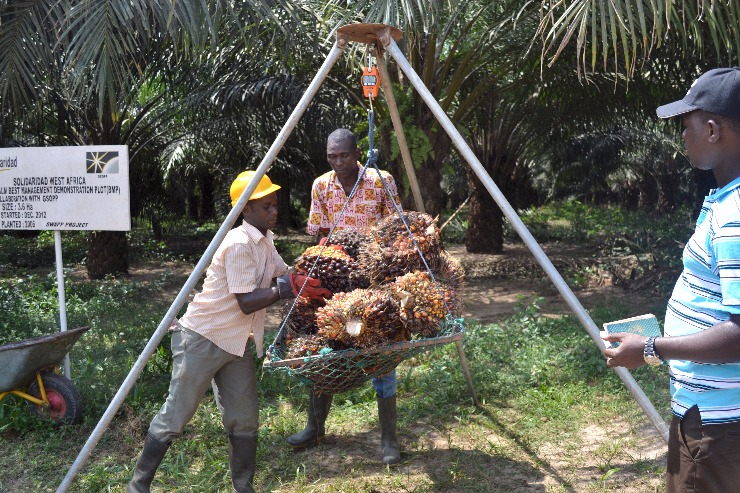
SWAPP Results
From 2012-2016, Solidaridad’s Sustainable West Africa Palm Oil Programme (SWAPP) worked to improve the incomes and livelihoods of palm oil producers throughout West Africa. The programme facilitated smallholder farmers in Ghana, Nigeria and Cote d’Ivoire to implement Best Management Practices (BMP) to increase farm productivity, and supported small and medium-sized mills in Ghana to increase their processing efficiency.
SWAPP was able to successfully prove the business case for the implementation of Best Management Practices (BMP) by oil palm smallholders, generating average yield increases from 5.3 to 19 tons of fruit per hectare per year among participating farmers between 2012 and 2016. However, in practice, oil palm smallholders often lack access to the high quality services and inputs they need to implement BMP on their farms.
Uniquely innovative approach
“This specific project follows a uniquely innovative approach, and has a high potential for positive impact,” said Christine Schneider, senior manager for Global Sustainability at Henkel Laundry & Home Care. “Solidaridad has implemented its innovative learning programme focused on best practices for farming to develop a competitive oil palm sub-sector in West Africa for four years, and it has already tripled smallholders’ average annual yields. We decided to join in and support this smallholder project in Ghana because we believe that the investment in Rural Service Centers and involvement in service delivery to especially smallholders is crucial for productivity improvement – and improves farmers’ incomes and living standards.”
Scaling Through Market Interventions
With the launch of this project, Solidaridad will establish four Rural Service Centres (RSCs) that will pilot a market-driven approach to providing oil palm smallholders with the services and inputs they need. The RSCs will provide farm management packages according to BMP standards, labour services and sales of high quality inputs. The RSCs will also serve as aggregation and transportation centres for the harvested palm fruits, earning revenues by charging fees for their services. As farmers’ yields increase substantially from the application of BMP, the cost of these fees will be more than offset by farmers’ increase in income. The RSCs are an innovative, market-driven solution that can facilitate further sustainable and cost-effective productivity by oil palm smallholders.
Solidaridad – through a new franchise formula – will provide the RSC entrepreneurs with a business model, coaching and business development advice, BMP knowledge, collective procurement benefits, and access to finance and investment. By 2020, the RSCs should be earning stable revenues as financially viable, commercial businesses. Solidaridad expects that a profitable model will catalyze local entrepreneurs to copy the RSC model, facilitated by the franchise model, allowing significant scaling to cover approximately 10% of the smallholder market over the next 10 years.
A sustainable future for farmers
“Achmea is originally an agricultural cooperative,” explained Karlijn Korten, programme manager at Achmea Foundation. “Now, 200 years later, Achmea continues contributing to a sustainable future for farmers, in the Netherlands and far beyond. We think that Solidaridad’s new pilot programme is strong because it makes a proven BMP approach scalable and empowers the local oil palm farmers. Palm oil may, at first sight, have a negative impact, but by focussing on the strengthening of the small-scale farmers, the pressure to build large plantations is reduced.”
Expected outcomes
The expected outcomes of the Ghana project are:
- Increased (net additional) income and better livelihoods for oil palm farmers
- At least 2,000 smallholders in four oil palm growing regions will increase productivity from 5 tons/ha/year to 12 tons/ha/year by end of 2020
- The established RSCs are earning stable revenues as financially viable, commercial businesses
- The RSCs contribute to better employment opportunities for youth and women
- A proven model for a scalable, market-driven solution for farmer extension services has been established
Building on past successes
“Solidaridad’s work under SWAPP has proven that smallholders can achieve equal or even greater yields than commercial plantations,” shared Rosemary Addico, Solidaridad’s palm oil programme manager in Ghana. “However, to do so, smallholders need access to the robust infrastructures that facilitate implementation of best practices. This includes access to training and technical assistance, affordable high-quality inputs, labour and access to finance and markets. Solidaridad is pleased to pilot its Rural Service Model and build on our experience in cocoa to apply this market-driven innovation in palm oil.”
Learn more about Solidaridad programmes for sustainable palm oil.
